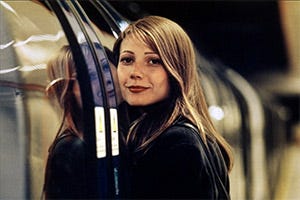One of my favourite Pulp songs (alongside Babies and This Is Hardcore) is 'Something Changed'. It's a love song, but a love song written from the perspective of someone evaluating the random series of events that led up to meeting their significant other. "You might have changed your mind and seeeeeeen your friend," Jarvis croons - an ode to those innumerable Sliding Doors moments that we unconsciously navigate every day.
My wife and I celebrate our fifth wedding anniversary this year, and ten years together in 2024. We often reflect on those Sliding Doors moments - we met at work but only got chatting on a night out. What would have happened if one of us had decided NOT to go on that night out? Or, on a more significant note, decided against going to work at We Are Social altogether?
In her excellent newsletter, The Marginalian, author Maria Popova considers serendipity and coincidence and how we process the events that make up those scenarios. Looking at the topic through the lens of Milan Kundera's Unbearable Lightness of Being, Popova highlights the importance of the factors we choose to pay attention to.
In other words, the things that we remember about situations. Returning to my example, I wonder, "What would have happened if I hadn't gone out that night?" placing myself and my decision-making at the centre of my narrative. I am, of course, the main character in my story. But if I had the opportunity to watch back, say, the whole day from a third-person perspective, I'd surely notice a myriad of other factors that went into my wife and I ending up in the same place at the same time and choosing to have a proper chat for the first time.
As much as we love a Sliding Doors moment, and as much as we love to think of ourselves as the main characters in our personal movies, life isn't really like that. The truth is we create those moments by noticing them and paying attention to them.
Popova quotes Milan Kundera on this topic: "Guided by [their] sense of beauty, an individual transforms a fortuitous occurrence… into a motif, which then assumes a permanent place in the composition of the individual's life". In other words, we must be alive to serendipity and chance encounters to notice them. We need an element of randomness and surprise in our lives.
That need for randomness and chaos is particularly acute for anyone involved in planning and creative pursuits. One of the most challenging things I found about the enforced/majority WFH period during the pandemic was remaining creative. I did my best to keep my creative muscles strong, making music and going for walks, but I missed the random serendipity that came from simply having more variation in my days. Getting on a train, going to meetings, having coffee with friends and colleagues - merely being in an office environment where there are different people to talk to. Pre-pandemic, these were not factors I considered particularly important to developing ideas or identifying the hidden obvious in strategic challenges. But being at home, doing the same things day in day out, with only very structured human interaction, made me see just how vital they are.
Nick Hearne, a creative and another former colleague at We Are Social, espoused the virtues of going for a walk to unlock a knotty creative problem. But the vital part of the walk was choosing a route or destination you hadn't walked before. Humans are creatures of habit and follow a lot of similar pathways. Nick's method (which I highly recommend) relies on breaking those patterns - do the same loop, but in the other direction. Walk down that one street near your house you never seem to go down.
By seeing your environment differently, you're forcing your brain to notice what's happening around you. Your mind should be more open and, in particular, open to new ideas or combinations - or even to serendipitous experiences. Giving your brain this freshness often helps unlock knotty creative or strategic problems. Walking somewhere random (alongside a strum on my guitar) was my go-to method for getting past those previously insurmountable creative or strategic blocks in those dark lockdown days.
But there were only so many walks you could go on during those 18 months, only so many times you could reverse your route on your morning commute around the block. What I missed was both the energy of being in a room with other people and those chance interactions or moments when actively not thinking or talking about the challenge ends up providing the solution.
Merriam-Webster defines serendipity as "the faculty or phenomenon of finding valuable or agreeable things not sought for" (emphasis mine). And that's often the case when thinking about a creative challenge. When you stop thinking about it, suddenly, the answer presents itself. The difficulty is that studies show that coming up with genuinely creative, original ideas takes time. You must get past the most obvious options and then navigate the uncomfortable middle period to get to the gold. But you also need the time, space and freedom to give your brain a break and let that unbidden, serendipitous thinking come to the fore.
Knowing when to push through and when to pull back is tricky. Many of history's great thinkers and writers were strict in approaching this aspect of their work. They had working hours, invariably in the morning. Once those working hours were over, they stepped away from their desks and used their afternoons for long walks or other wholesome activities.
Adding that kind of rigour and freedom to our processes is all about balance. You could encourage yourself and your teams to spend two hours thinking, talking and working through a challenge. Then drop it and do something else (I doubt your employer will endorse long, two-hour country walks during billable hours). Come back again and repeat the process.
You’ll be surprised to see what kind of serendipitous results you might find when you've not been looking. Indeed, many people say they've even found love while not looking for romance. Ideas aren't quite like meeting the love of your life, but by being alive to chance encounters and serendipitous experiences, you might find something's changed in your approach, definitely for the better.




